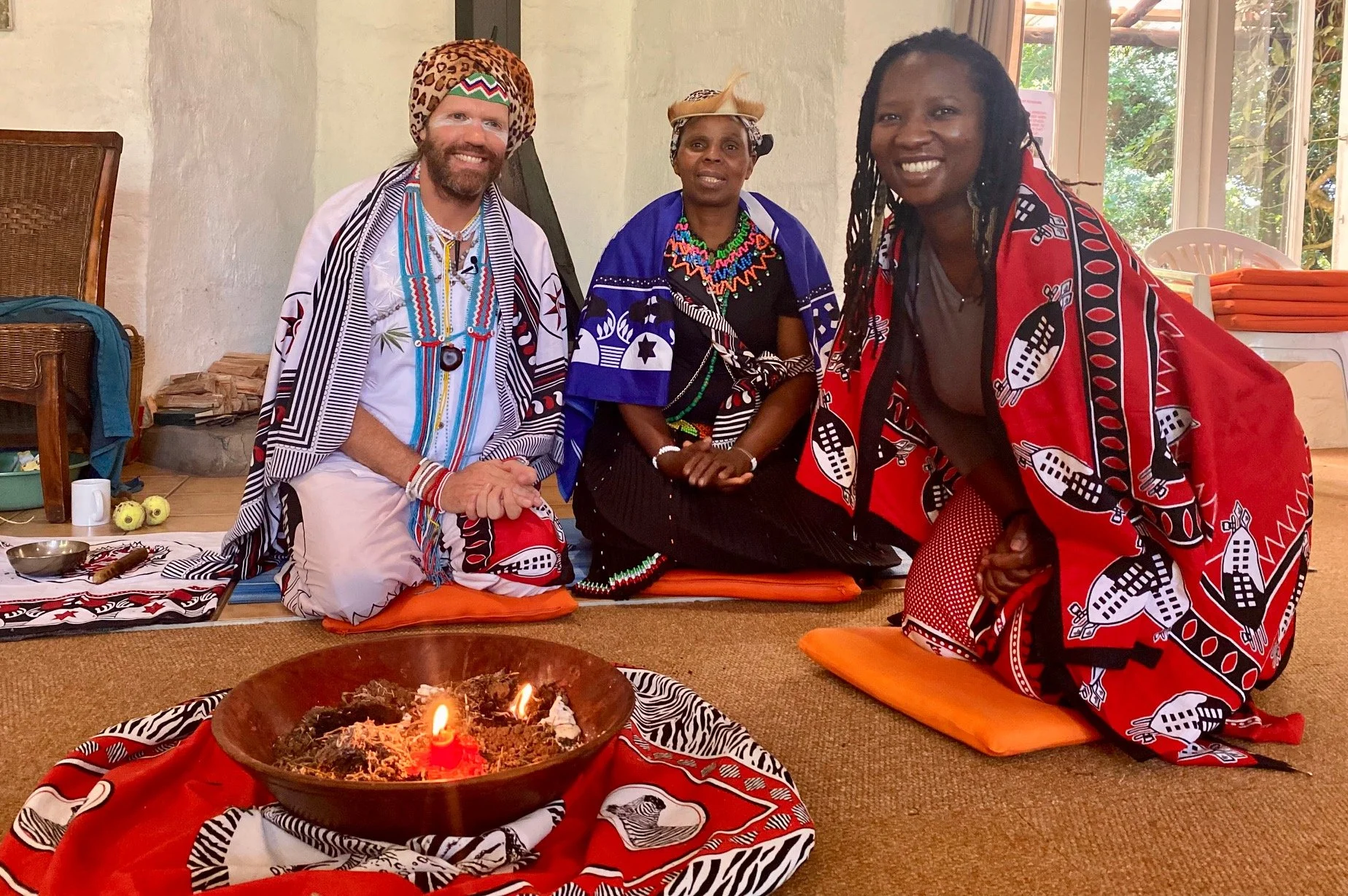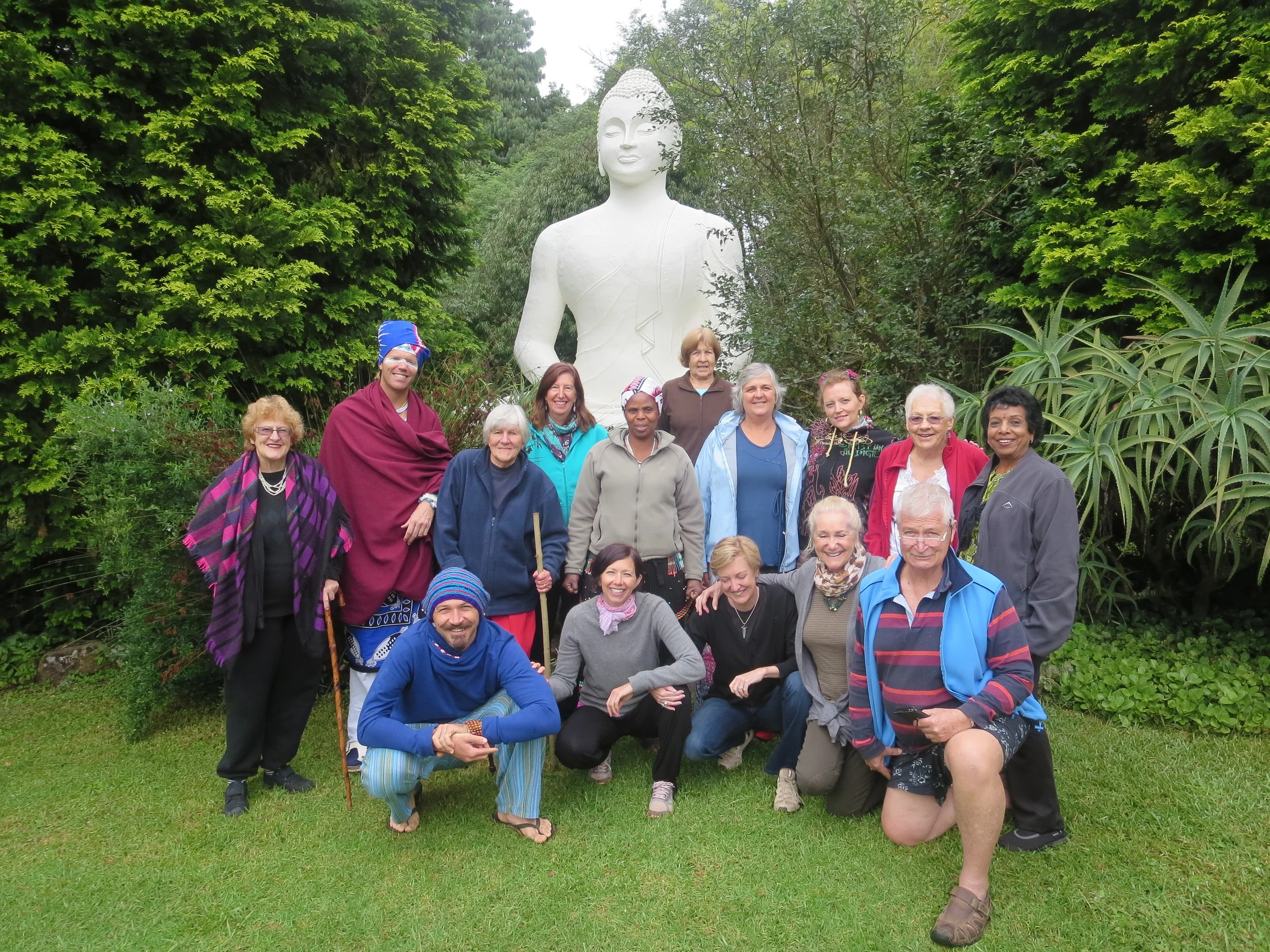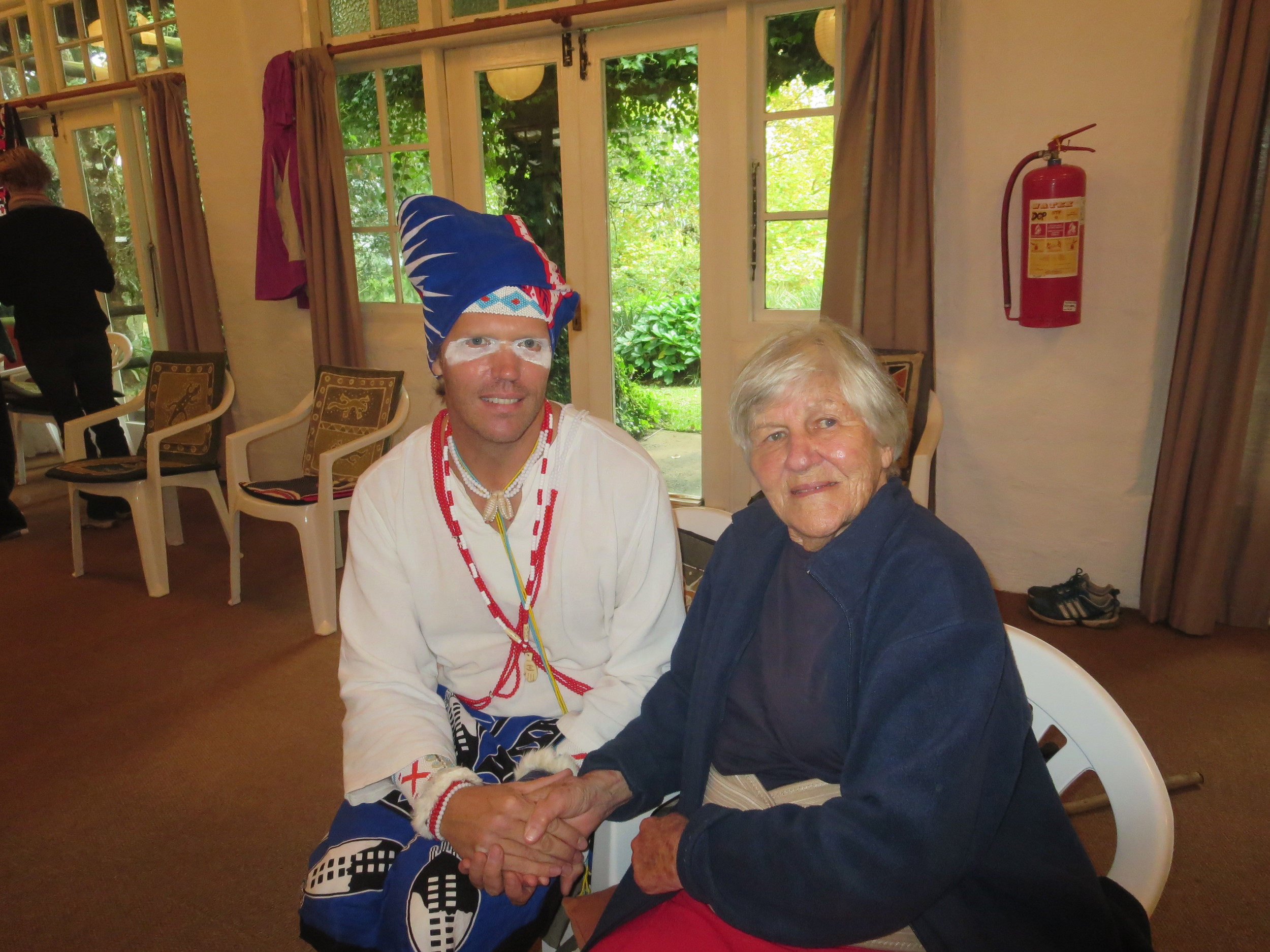On the 21 January this year 2011 I hosted an ‘umsebenze’ (spiritual work) at my teacher’s home in the Eastern Cape to give thanks to my teacher & husband for their support and encouragement. I also wanted to give thanks to the guiding ancestors from both their families. A third aspect of the thanksgiving was to give thanks to the elders and fellow community members who have stood by me from the early days of my apprenticeship and supported all my ceremonies. I also mentioned the international community, people in Ireland, UK, USA & Mexico who have supported my workshops, and I thanked them.
A key aspect of all Sangoma work is ‘ukuqula’ which means to honour and praise. The elders were particularly proud of my work and said it was unusual for a Sangoma to return to their teacher and say thank you. This use to happen in the olden days, but a lot has been forgotten. I always say that if it wasn’t for my teacher and husband’s support, and the support from the elders in the community, I wouldn’t be the person I am today. Also it is important to mention that I was very sick with the calling illness, ‘twaza’ when I arrived at the ‘Sukhwini’ home and I was treated with love and support. And I can never forget this.
I was trained and apprenticed by one of the poorest communities in South Africa. Many people ask why it is that I return every year to work with the poorest of the poor in a township in the Eastern Cape. And my response is always the same. The depth of spirit and humility which I have felt at my teacher’s home is beyond comprehension. And her community have stood by me for many years and assisted and supported me through all my ceremonies. A Sangoma is a community medicine person, and their job is to serve their community. My primary community is in the Eastern Cape and they in affect have loaned me to the international community. Even though I travel all over the world bringing my Xhosa medicine and Sangoma teachings, it is imperative that I return every year to fill my elders in with what I am doing. They initiated and trained me, so I am first and foremost their Sangoma.
I took time during the weekends ceremony to talk about my work overseas and to tell the elders, fellow Sangomas and other community members about how ‘Ubuntu Ubunzulu’ (depth of humanity, Sangoma teachings) has been received overseas. I told the community that the people overseas love my Xhosa singing and drumming, and they love the teachings on how to connect to the Ancestors, dreams, and natural world.
In South Africa amongst my community in the Eastern Cape my job is to hold a mirror to the people and show them how beautiful their culture is, and how beautiful they are. In Europe and the Western world I show people how to remember their ancestors and dreams through prayer, meditation, ceremony and medicinal plants.
With grinding poverty in the Eastern Cape, disease and a high death rate it is very easy for hopelessness to sink in. Also the empty glamour of westernisation with all that it brings can sometimes lure the youngsters away from their traditions and culture. I teach people to remember the old ways of their ancestors, the ways of dreaming and plants because these ways are so fragile and so beautiful. I talked to the community about the Western World, and how people have forgotten their ancestors, and how to work with dreams and medicinal plants. I spoke to them about the high levels of depression which is spreading in Europe and America. I encouraged the people to continue to follow their old traditions which are still alive and strong in the community, and are held by Sangomas, like my teacher, and myself.
When I finished my 'Indaba' one of the elders stood up and said with tears in his eyes, "Ucingolwendaba uyahamba phesheya ukufundisa abantu". John go overseas and teach the people. I had his support. The other elders nodded their heads in approval.
One of the jobs of a Sangoma is to channel information from the ancestral or spirit world and give this information to the community. So one of my primary roles as a Sangoma is to give ‘indaba’ or spiritual news to the community. We wear white clay around our eyes to signify our job as channelers, seeing into the spiritual world.
Please read a copy of ‘Indaba’ or spirit news that I read to the community, elders and fellow Sangomas, below. I have translated the Xhosa into English further down.
Indaba Zikacingolwendaba
Isixhosa
Ndihambile phantsie omhlaba wonke, Australia, England, Ireland, Germany, France noMzantsi Afrika wonke. Kuzo zonke ezindawo andikubonanga okanje andiluvanga unxibelelwano eninalo apha eRhini/ Joza.
Mawethu zingceni ngamasiko nezithethe zenu. Nenethamsanqa nobutyebi obungaphaya. Anina mali kodwa ninxulumene nezinyanya zenu.
Xa nisombela nikwaxhentsa, ninyusa umoya wabaphantsi nivuselela nathi.
Ndixelela abantu phesheya, apha Mzantsi Afrika sinayo igolide engamagqirha.
Elizwe liyathsabalala bahlobo bam.
aEurope abantu bakhona balibele ngendlela endala yokuphila. Leyafa elizwe labo, ngenxa yokunyoluka nokungabina buntu.
Ninika ithemba kuba apha ndifumene ubuntu obunzulu. Naphina apho ndikhoyo ndiyaliva ifuthe lobuntu.
Botata nanimadoda sanakulibala ukufundisa abantwana benu ngamasiko nezithethe zenu.
Xa nisenza omsebenzi apha eJoza nithumela ilitha ehlabathini. Ninika abantu ithemba, Enkosi.
Spirit News by John Lockley 'Ucingolwendaba'
English
I have travelled all over this world, such as Australia, England, Ireland, Germany, France and all over South Africa. In all these places I have not seen or felt the connection to the Ancestors that I have felt here in the Eastern Cape, Joza location.
Ladies and Gentlemen be proud of your culture and customs.
You are lucky and rich. You have no money but you are connected to your ancestors.
When you sing and dance you raise the spirits of the Ancestors. I tell people overseas that here in South Africa we have gold, the Sangomas.
The world is dying, my friends.
In Europe people have forgotten the old ways of living.
The world is dying because of greediness and a lack of humanity.
You give hope because here I receive the depth of humanity through Sangoma teachings. Wherever I am in the rural Eastern Cape I feel the presence of humanity and the Ancestors guiding us.
Fathers and men don’t forget to teach your children your culture and customs.
When you do spiritual work here in the Eastern Cape you send light throughout the world.
You give people hope, thank you.










